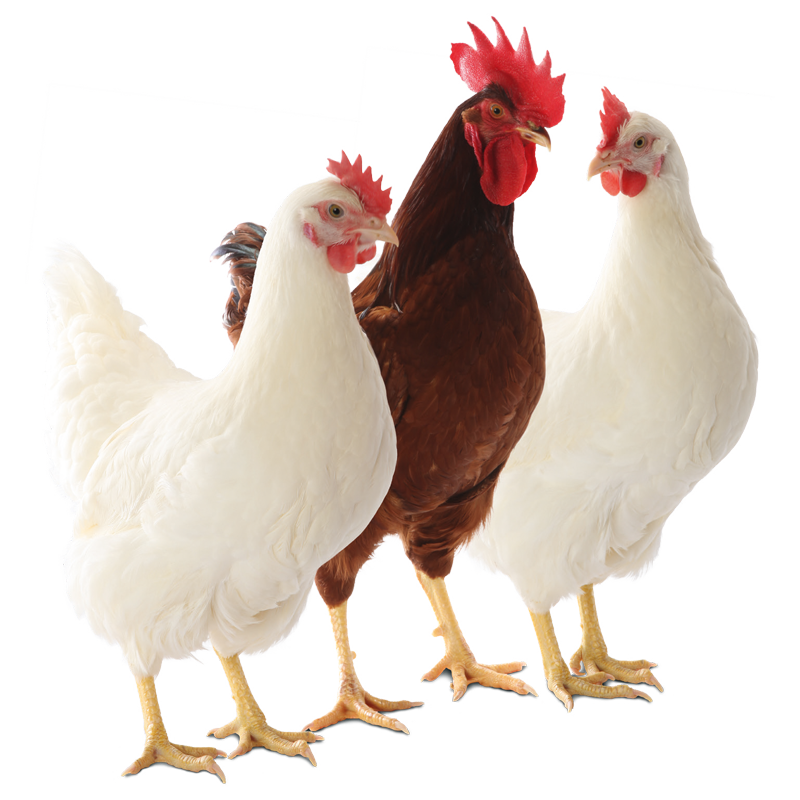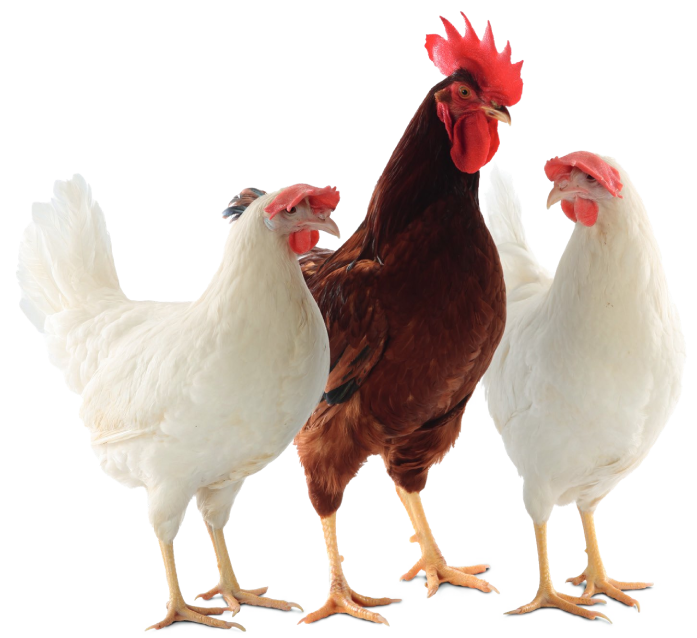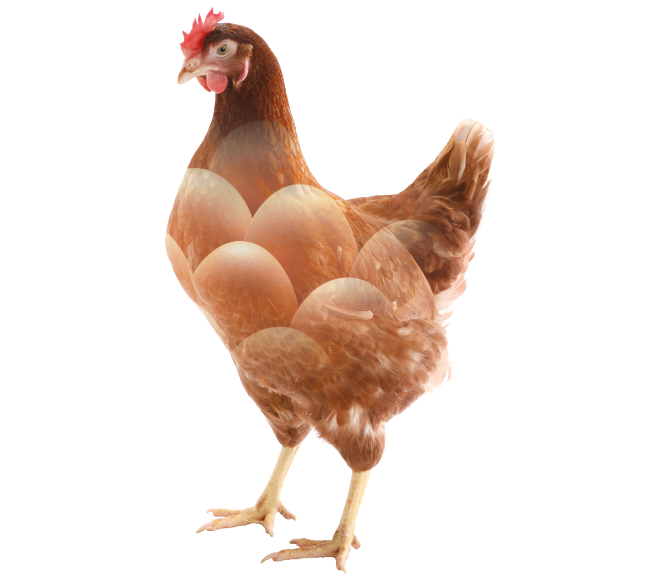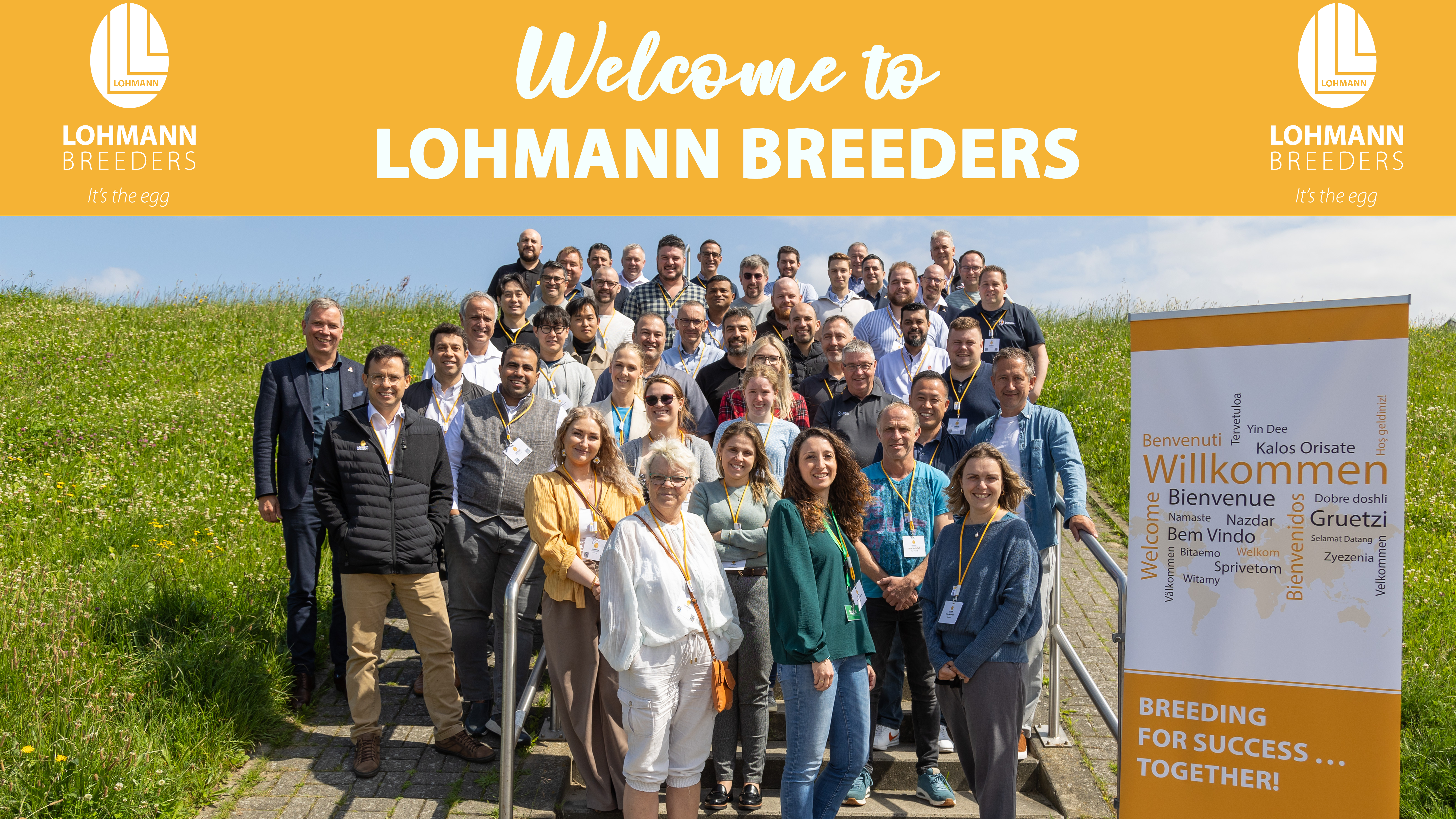Genome wide marker-assisted selection has become a standard in cattle
breeding and will be so in chicken as
well.
Breeders routinely select bulls from an insemination catalogue according to genomic breeding values. This genomic selection has been proven and leads to an increase in the performance rate in dairy cattle. With a large number of markers, i.e. up to 500,000 per animal, genetic estimations can now be reliably predicted regardless of age. The markers are distributed throughout the entire genome of the animals thus enabling reliable results as all relevant breeding traits are available.
The maximum number of saleable eggs produced per hen housed particularly determines the commercial success of laying hens. This is achieved by combining high laying performance with commendable vitality and is therefore our primary selection criteria in the selection of genetic stock.
During the last ten years, no other competitor has managed to achieve anything close to the good shell stability of the laying hens at LOHMANN TIERZUCHT.
All the competitors spend their efforts propagating on an extension of the production cycle thereby forgetting that it is the shell quality and not the laying rate which determines the optimum production period of a flock. Those who do not have shell stability under control should not be promoting a longer and most of all, unrealistic production cycle without moulting.
In addition to the exact measurement of shell stability by means of different methods and in different stages of a production cycle, the real emphasis in breeding targets has a decisive effect on the annual improvement rate. These comprehensive phenotypic measurements of the quality parameter at LOHMANN TIERZUCHT will now be supplemented by genomic markers.
The most promising males, as based on the performance, behaviour and quality parameters, can now be selected already in the rearing period before sexual maturity. Since the measurement of late egg quality can only take place after the reproduction of pedigree hens, the application of markers for genomic selection contributes to a substantial advantage in precision and can be simultaneously applied for all persistency traits even earlier. Genomic selection is only possible when different parameters to describe egg shell stability in a breeding programme have been measured in numerous birds over several generations and stored in a large database.
For more than ten years now, LOHMANN TIERZUCHT is the first breeding company which utilises equipment for the mea– surement of dynamic stability in eggs in its breeding programme. Research was carried out in close collaboration with scientists from Belgium and Scotland and developed for practical use. If competitors were to now advertise that they have been using these equipment, this would only be a copy of the recording methods which have been applied at LOHMANN TIERZUCHT years ago. As the breeding progress cannot be achieved exclusively in a single generation but is based rather on the results of a continuing and rising process, the disadvantage in terms of time must first be regained. This is even more difficult when the levels of the own lines have been lower so far. Since all other strains have been performing remarkably poorer up until now, catching up will be even more difficult since new and even better recording methods at LOHMANN TIERZUCHT are already being further developed.
Elaborate analyses of the vitality of individual outstanding families have led to the identification of especially meaningful markers in different strains. With the aid of the same, it is now possible to sustainably improve the performance stability of the next generations.
With this selection and product campaign, GenomChicks®, LOHMANN TIERZUCHT will yet again set a mark in terms of applied research and the rapid implementation in breeding practice. A further milestone in the breeding of laying hens will definitely be imitated again in other breeding companies, but this will only be a copy.
The first parent stocks of white as well as brown layers from the programme GenomChicks® will be available in spring of 2013. These will be introduced at the VIV Asia Show in Bangkok and offer tested quality for performance-based producers with different management and production systems in the future – from cage-housing to floor and free-range management all the way to very demanding organic housing. All breeding hens and cockerels are genomically pre-selected and will provide the best egg quality and above average vitality as well as top performance for all laying hen owners.
Prof. Dr. Rudolf Preisinger

Source: Affymetrix UK Ltd
Breeders routinely select bulls from an insemination catalogue according to genomic breeding values. This genomic selection has been proven and leads to an increase in the performance rate in dairy cattle. With a large number of markers, i.e. up to 500,000 per animal, genetic estimations can now be reliably predicted regardless of age. The markers are distributed throughout the entire genome of the animals thus enabling reliable results as all relevant breeding traits are available.
The maximum number of saleable eggs produced per hen housed particularly determines the commercial success of laying hens. This is achieved by combining high laying performance with commendable vitality and is therefore our primary selection criteria in the selection of genetic stock.
During the last ten years, no other competitor has managed to achieve anything close to the good shell stability of the laying hens at LOHMANN TIERZUCHT.
All the competitors spend their efforts propagating on an extension of the production cycle thereby forgetting that it is the shell quality and not the laying rate which determines the optimum production period of a flock. Those who do not have shell stability under control should not be promoting a longer and most of all, unrealistic production cycle without moulting.
In addition to the exact measurement of shell stability by means of different methods and in different stages of a production cycle, the real emphasis in breeding targets has a decisive effect on the annual improvement rate. These comprehensive phenotypic measurements of the quality parameter at LOHMANN TIERZUCHT will now be supplemented by genomic markers.
The most promising males, as based on the performance, behaviour and quality parameters, can now be selected already in the rearing period before sexual maturity. Since the measurement of late egg quality can only take place after the reproduction of pedigree hens, the application of markers for genomic selection contributes to a substantial advantage in precision and can be simultaneously applied for all persistency traits even earlier. Genomic selection is only possible when different parameters to describe egg shell stability in a breeding programme have been measured in numerous birds over several generations and stored in a large database.
For more than ten years now, LOHMANN TIERZUCHT is the first breeding company which utilises equipment for the mea– surement of dynamic stability in eggs in its breeding programme. Research was carried out in close collaboration with scientists from Belgium and Scotland and developed for practical use. If competitors were to now advertise that they have been using these equipment, this would only be a copy of the recording methods which have been applied at LOHMANN TIERZUCHT years ago. As the breeding progress cannot be achieved exclusively in a single generation but is based rather on the results of a continuing and rising process, the disadvantage in terms of time must first be regained. This is even more difficult when the levels of the own lines have been lower so far. Since all other strains have been performing remarkably poorer up until now, catching up will be even more difficult since new and even better recording methods at LOHMANN TIERZUCHT are already being further developed.
Elaborate analyses of the vitality of individual outstanding families have led to the identification of especially meaningful markers in different strains. With the aid of the same, it is now possible to sustainably improve the performance stability of the next generations.
With this selection and product campaign, GenomChicks®, LOHMANN TIERZUCHT will yet again set a mark in terms of applied research and the rapid implementation in breeding practice. A further milestone in the breeding of laying hens will definitely be imitated again in other breeding companies, but this will only be a copy.
The first parent stocks of white as well as brown layers from the programme GenomChicks® will be available in spring of 2013. These will be introduced at the VIV Asia Show in Bangkok and offer tested quality for performance-based producers with different management and production systems in the future – from cage-housing to floor and free-range management all the way to very demanding organic housing. All breeding hens and cockerels are genomically pre-selected and will provide the best egg quality and above average vitality as well as top performance for all laying hen owners.
Prof. Dr. Rudolf Preisinger

Source: Affymetrix UK Ltd






